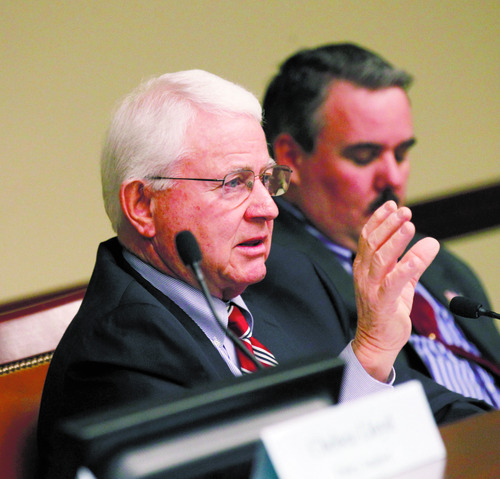This is an archived article that was published on sltrib.com in 2013, and information in the article may be outdated. It is provided only for personal research purposes and may not be reprinted.
In a conflict between federal and state laws related to firearms sales or possession, Utah's statute would reign supreme under a bill advanced Monday by the House Judiciary Committee.
Rep. Brian Greene, R-Pleasant Grove, watered down his original version of HB114 by removing a controversial provision making it a felony for any federal agent who attempted to seize guns from Utahns, but the measure clung to its core motive — allowing the state to retain control over its firearms laws.
"It's a much more condensed bill compared to the original," Greene said, "but I think it establishes firmly that we believe, as a state, that we are the primary safeguards ... of our state."
HB114 passed 7-2, with two Democrats opposing it.
The measure is similar to about two dozen other bills introduced in legislatures nationwide that push back against proposals by President Barack Obama to change current gun laws, including an effort to close loopholes on background checks and reduce magazine capacity on firearms.
Under Greene's proposal, such provisions would not hold legal primacy in Utah and the state would restrict U.S. agents from enforcing those federal laws.
HB114 is also one of several measures being pushed by Utah lawmakers to loosen gun laws, including a proposal by Rep. John Mathis, R-Vernal, who wants to do away with a requirement to obtain a concealed-weapons permit in order to carry a gun hidden from view.
But while four high-profile gun measures passed through committees on Feb. 20 — dubbed "Gun Day" at the Utah Capitol — Greene's was the only one that languished in committee. Monday's hearing was its third attempt at getting through after the first two were hamstrung by lengthy public testimony and concerns by several lawmakers about a lengthy analysis as to whether the measure would hold up to constitutional scrutiny.
It was a key reason as to why Rep. Brian King, D-Salt Lake City, opposed the measure. He cited the legal analysis offered by legislative attorneys who believe the measure violates the Supremacy and Commerce clauses of the U.S. Constitution.
"The regulation of arms," King said, "is squarely within the duty of Congress."
Rep. V. Lowry Snow, R-Santa Clara, also worried about the bill's sweeping effect on agencies such as the Transportation Security Administration and its ability to enforce federal firearm laws at airports or U.S. marshals executing warrants on federal crimes.
Snow, an attorney, who ultimately voted for the bill, said he would work with Greene on those issues before the measure reached the House floor.
The proposal may also have trouble in the Utah Senate.
Senate President Wayne Niederhauser, R-Sandy, said he'd prefer the gun bills be vetted through Senate committees, but with Greene's measure still awaiting a House floor vote with 10 days left in the session, the time crunch may be too severe.
Sen. Majority Leader Ralph Okerlund, R-Monroe, also said that even though the felony charges were removed from HB114, the concerns raised by Snow as well as the constitutional note attached to the measure remained problematic.
Clark Aposhian, chairman of the Utah Shooting Sports Council, said he was glad to see the measure advance and believed the bill sent a strong message to the federal government.
"If you violate the Constitution, if you come into Utah and violate our laws ... just because you're a federal official doesn't give you an exemption to that," Aposhian said. "If you violate the Second Amendment, the Bill of Rights of the U.S. Constitution, well you can't play fast and loose with that."
The measure now moves to the full House.
Twitter: @davemontero



